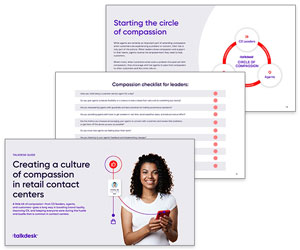We present the answers to questions that we are frequently asked around emotional intelligence and the contact centre.
These answers come from Sandra Thompson, a customer experience consultant, who is also the UK’s first Goleman Emotional Intelligence Coach.
What Is Emotional Intelligence?
The definition that I always quote is Daniel Goleman’s from his book “Emotional Intelligence – Why it matters more than IQ”. This is as follows:
“Emotional Intelligence is your ability to recognise and understand emotions in yourself and others. It’s your ability to manage your behaviour and relationships.”
What Is the Difference Between Emotional Intelligence and Empathy?
Empathy is one of the 12 competencies that people need to master in order to become more emotionally intelligent.
Although people often think that emotional intelligence and empathy are the same thing, you need a lot more than empathy to be emotionally intelligent.
Take a look at the list of 12 competencies and you can see just how much more there is to benefit from being emotionally intelligent.
Looking to build empathy in your contact centre? There are some great training exercises in our article: How to Coach Empathy in the Contact Centre – With Three Training Exercises
How Can I Test My Emotional Intelligence?
There are a number of tests out there that you can take, but a really great test that I always recommend is by US consultancy Six Seconds.
If you don’t fancy taking a test, there is another approach to this. Simply think about two things:
1. How well do you think that you know yourself?
Invite others to give you insights into what you are great at.
Invite others to give you insights into what you are great at. Get them to describe aspects of your behaviour that may not serve you well and you may want to improve. That will help you to understand the difference between what you perceive yourself to be and what other people perceive you to be.
If you’re shocked by what you hear from others, you’ll need to work on your self-awareness, which is the first of the 12 Emotional Intelligence competencies. If there were few surprises, chances are you already have a high degree of emotional intelligence and you’re on your way to mastering the skill.
2. Have there been times when you have reacted negatively to various stimuli?
How would you rate your reactions to things? Have you dealt with an unexpected act or comment calmly and decided to respond [which means considering what you say and how you say it]. Or, have you lost your temper and felt out of control. Your ability not to react instantly – to avoid knee-jerk reactions – is a sign that you are emotionally intelligent.
If you think you react more than you respond, consider: what could I do to better manage my emotions? What might happen if I took seven deep breaths. Could there have been a better outcome?
How Can You Increase Your Emotional Intelligence?
There are a number of things that you can do to increase your self-awareness, which is the most significant of the twelve competencies within the emotional intelligence skill.
Consider these:
- Writing a journal each day. Put a timer on your smartphone and write for just two minutes, every day, and comment on either something that’s about to happen or something that has happened. This exercise will increase your self-awareness because you will start to see some patterns in your thinking and you’ll start to widen the vocabulary you use to describe how you feel.
- Breathing exercises. We don’t think enough about how we breathe. Try to take conscious breaths. This involves breathing in through your nose, holding it and breathing out through your mouth. Just taking seven intentional breaths can help you to recognize and manage the emotions that you are feeling.
One final tip – although there are so many to pick from – is to take a walk in nature; immerse yourself in it. Do this and consider the sights, the smells and textures, allowing your mind to wander off. Then bring it back and consciously consider your breathing.
This final exercise not only can help you develop self-awareness into how your brain is operating and what’s filling your mind, but it increases your skill of adaptability. This is another key competency of emotional intelligence.
How Can I Train Emotional Intelligence in the Contact Centre?
The first thing to do is invite people to talk about how they are feeling. While that may sound like a scary prospect, in my experience, it’s likely that people are happy to talk about it, if you give them a safe space and the tools to help them find the words to express themselves.
One tool that will further help your team to discuss their feelings openly is a set of emotional culture cards. I’ve just become an Elephant Rider and I’ve started using these cards to help people have more meaningful conversations.
Tools like this will help your team find the language to explain what they are feeling. People will then start to understand one another’s stories more, which enables advisors to become more empathetic with one another and that helps to build trust.
Listen to what is being said, how people tell you they are feeling. Attached to their behaviour, it does make you much more attuned to phone calls, emails and messages.
Listen to what is being said, how people tell you they are feeling. Attached to their behaviour, this does make you much more attuned to phone calls, emails and messages.
Also, perhaps most valuable in the contact centre, by becoming more attuned to people’s feelings, you learn how to ask better questions – open, genuine and authentic questions.
How Can I Defuse Emotional Situations With Customers (in the Contact Centre)?
Having to defuse an emotional situation can be tough. You won’t know what’s been going on for the other person to cause them to behave in this way.
We know that emotions drive behaviour, but it would be guesswork to try and figure out what led them to flare up.
Time and again I use this simple but effective technique to defuse a situation.
- I wait for the customer to finish talking.
- I’ll tell them that I have been noting down what they had to say as it’s very important that I understand what has happened for them in this case.
- I ask them if it’s OK to go through what I thought I heard.
- I do all of this in a slow, confident but low volume and calm voice.
- I replay the key things I have heard and I ask the customer to tell me what I have misheard and what I have missed altogether.
This fifth step is the biggest step to defuse an emotional situation, as nine times out of ten the person just wants to be heard. The customer is full of either fear, frustration or anger because they wanted the ‘thing’ resolved and they couldn’t see how that would happen.
When you have “played back” what they have said, they feel they can trust you as they know you have the ability to listen. It’s a game changer.
What Characteristics of a Caller’s Voice Help You Determine Their Emotional State?
Our voices are brilliant instruments that convey emotions. There’s a school of thought that says our voices (other than those of actors) express emotion far more openly than our body language and our facial expressions – we can’t control our voice as much as we can other non-verbal signals.

Consider; the tone of the voice, the speed of the speech, the emphasis on some words and not others
Take a moment to consider: the tone of the voice, the speed of the speech, the emphasis on some words and not others, the volume, the words spoken, the words you perceive the person has left out of the conversation you are having (that feels like the elephant in the room and you think to yourself, why are they avoiding this topic?).
Consider the sounds a person makes like sighs, grasps or a tut. It’s tempting to think about how we use our voice and to consider how other people we know use their voice in situations, but don’t be tempted to jump to conclusions about what you think your customer’s voice represents. It’s best not to jump to conclusions about how the caller is feeling before you try and understand.
What Can I Do to Build Emotional Connections With Customers?
One of the most effective ways to build an emotional connection with someone is to do something meaningful for them or thoughtful.
People are interested in what you can do for them. How you can make things easier, make problems go away or avoid issues happening.
What experiences do you remember that make you smile?
If you take a moment to think of your own experiences – either as a customer or with friends – what experiences do you remember that make you smile?
The chances are that someone did something for you that you may not have had the time or the skills to do yourself and that made you feel good. They helped you out but in a way that was slightly better than what you expected.
The answer to this question will be dependent on how much autonomy you have to say something specific or do something special for a customer.
It’s important to note, however, that there are ALWAYS opportunities to make a connection.
Imagine you are an advisor who has to follow a script. Even though you have a set of things you have to say, it’s likely that the customer will say something that you can mention at the right point on the call. Whether that’s asking about the breed of the dog you hear barking in the background or even asking them what they most enjoy about gardening if they have made reference to it – whatever you feel comfortable with and what you think is a genuine comment said with sincerity.
I’ve felt connected to brands when they take a moment to understand what would make things easier for me, how they can do things to save me time or prevent me from wasting time.
What Skills Make up Emotional Intelligence?
According to Daniel Goleman there are twelve key competencies that make up the emotional intelligence skill. These are divided into four key categories:
Category 1 – Self-Awareness
- Emotional self-awareness
Category 2 – Self-Management
- Emotional balance
- Adaptability
- Achievement orientation
- Positive outlook
Category 3 – Social Awareness
- Empathy
- Organizational awareness
Category 4 – Relationship Management
- Influence
- Coach and mentor
- Conflict management
- Teamwork
- Inspirational leadership
For more on these 12 competencies of emotional intelligence, read the following article from The Harvard Business Review: Emotional Intelligence Has 12 Elements. Which Do You Need to Work On?
How Long Does It Take to Learn the Skill of Emotional Intelligence?
I think that you can master self-awareness and definitely get into a better position to learn the skill – in terms of your own emotional intelligence – within 18 months.
Yet, because everything changes around you – in terms of your home life, the people that you work with and the work that you are doing etc. – it is a lifelong learning journey.
Why Does Emotional Intelligence Matter Within Customer Journey Mapping?
Good customer experience creates positive memories, and that’s what brands need. Memories are driven by emotions.
When you connect with someone emotionally, and build an emotional connection, you are more likely to create a positive memory.
If you create a positive memory, customers will remember you more for the good things when they are presented with competitors. They are less likely to leave you and try the competitor.
For more from Sandra on this topic, make sure you read her article: Creating Memorable Customer Experiences With Emotional Intelligence
What Evidence Is There That Emotional Intelligence Helps Businesses Succeed?
Imagine being able to charge 8% more, per hour, per client, because you have the skill of emotional intelligence.
Well, that is indeed the case within a professional service environment, according to Ronda Muir, who wrote the book: “Beyond Smart: Lawyering with Emotional Intelligence”.

Sandra Thompson
People with emotional intelligence also tend to lead healthier lives. They encounter fewer heart attacks, strokes and cases of depression.
Another interesting statistic, from a Career Builder survey, is that 75% of employers said they are more likely to promote a worker with high emotional intelligence – and there are lots more pieces of research like this out there.
Thanks to Sandra Thompson for answering our questions. If you want to find out more from Sandra, check out her Applied Customer Experience Course.
For more content from us that delves into the role of emotions within the contact centre, read our articles:
- 7 Steps to Evoke the Emotions You Want From Your Customers
- How to Measure Customer Emotion
- Podcast: How Can You Use Customer Emotions to Your Advantage?
We also have a podcast episode with Sandra herself, entitled: “Customer Experience: The New Thinking for Delighting Your Customers.” You can check out our conversation below.
The Contact Centre Podcast – Episode 12:
Customer Experience: The New Thinking For Delighting Your Customers
For more information on this podcast visit Podcast – Customer Experience: The New Thinking for Delighting Your Customers
Author: Robyn Coppell
Reviewed by: Megan Jones
Published On: 27th Jan 2021 - Last modified: 6th Apr 2024
Read more about - Skills, Emotion, Empathy


































